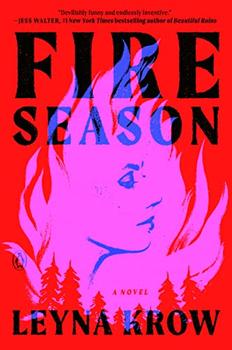Summary | Excerpt | Reading Guide | Reviews | Beyond the Book | Readalikes | Genres & Themes | Author Bio

A Novel
by Leyna Krow1
On August 4, 1889, Barton Heydale spent his lunch hour with a prostitute named Roslyn who lived and worked in a two-room apartment in Wolfe's Hotel on Railroad Avenue. The apartment was above a lunchroom, where Barton often stopped for something to eat after his visits with Roslyn. But on this day, he was consumed with the trouble of making a decision, and so he chose to forgo his meal in favor of sitting in Roslyn's tiny kitchen and smoking cigarettes.
The thing he was trying to decide: where, and when, to kill himself.
Barton had not set upon his path to suicide lightly. He'd assembled his justifications, which read as such: he was lonesome; he was generally disliked; and he was ugly. None of these conditions, he felt, had any hope of improving. They would only worsen as the months and years passed.
Barton was twenty-nine years old and the manager of the only bank in Spokane Falls. This position should have garnered him respect and power. It instead earned him nothing but ire from the local citizenry, who, it turned out, had little trust for institutions, financial or otherwise. As a result, Barton had not married, or even made a single friend, in his six years in Spokane Falls. The strain of this lonesomeness had taken a toll on him physically. He'd grown portly and unfit. He wheezed when he walked too quickly. And to top it off, he'd just the afternoon prior received a terrible haircut.
Strangely, though his hair would grow back, it was this final offense that convinced him he was beyond salvage. He could not continue to exist in his current form. So, today would be his last. His last breakfast, his last time washing his face, blowing his nose, tying his shoes. And here with Roslyn, his last fuck. The fucking had been the same quality as always; no great send-off. This observation depressed him even more.
After each cigarette he finished, he pitched the butt out the kitchen window and watched it spiral to the alley below, the last bits of ash and smoke forming a satisfying tail. Then he rolled and lit a new one. If Roslyn's apartment were on a higher floor, he reasoned, he would jump from the window. But Wolfe's was only two stories tall. In the other room, Roslyn snored, asleep in her bed. She was a drunk. The later in the day he called on her, the more likely he was to find her asleep or sick. On this particular day, she was already stewed by the time Barton arrived at noon, and barely able to finish performing her services before nodding off.
Even if Barton could not jump out of the window, he did think he'd like to jump from something. That seemed a good way. Dramatic and quick. He would do it someplace where everyone in town could see. Then they'd all feel bad for how they'd treated him. They'd be so sorry, they'd reexamine their whole lives and ways of being. Maybe some of them-those who'd known him most immediately-would kill themselves as well, unable to cope with their role in his death. It cheered him slightly to imagine. He would jump from the bridge into the river. That was his choice. He'd made his decision and that felt good too.
He kept an eye on his watch, and when it said five minutes to one, he stood up from the chair, ran a hand through his terrible hair to straighten it, left his money for Roslyn on the kitchen table, and headed back to work. He was very strict with his employees about taking only an hour for lunch, no more. He adhered to the same rule himself. So if he was not going to kill himself right then and there, he felt he must return to his desk, even though it was a Sunday and no one else would be at the bank to see if he came back on time-or at all, for that matter. Barton worked seven days a week. He had never been absent or late. And today, just because it was his last day, would be no exception.
When the end of his workday did come, Barton locked the bank and walked with courage and purpose to the Post Street Bridge as planned. When he got there, his pace slowed. He stopped in the middle and assessed the situation. He had wanted witnesses, a horrified and grieving public. But weren't there perhaps a few too many witnesses? The shores were taken over by families seeking solace from the late afternoon heat in the shade of pines, their feet in the water, children splashing nearby. Should children see such a thing? Barton had his ethics to consider. Also, the river was low. The summer's temperature had been unrelenting, and now, in August, only a foot or two of water passed below the bridge. It wasn't enough. He couldn't swim and was counting on drowning in the mighty Spokane.
Excerpted from Fire Season by Leyna Krow. Copyright © 2022 by Leyna Krow. All rights reserved. No part of this excerpt may be reproduced or reprinted without permission in writing from the publisher.
Your guide toexceptional books
BookBrowse seeks out and recommends the best in contemporary fiction and nonfiction—books that not only engage and entertain but also deepen our understanding of ourselves and the world around us.